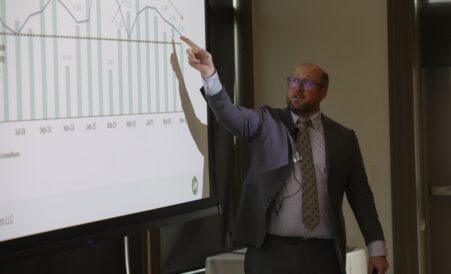Provo Municipal Council members discuss housing availability in city

Harrison Epstein, Daily Herald
People listen to Provo Municipal Council member Rachel Whipple during an open house on housing in the city on Tuesday, Feb. 22, 2022.
Everyone in Provo has felt the effects of housing availability, or lack thereof. On Tuesday, Provo Municipal Council members Rachel Whipple and Katrice MacKay met with members of the public to discuss ongoing issues in regard to housing.
The two spoke with around 40 people in a church community center, hearing their stories and answering questions.
While talking about the Provo Housing Authority and the steps they’re taking, MacKay reminded the group that the issue goes beyond city boundaries. “It’s all in Provo and we need other cities to realize the benefit and the importance of helping out this area,” MacKay said.
In her opening message, Whipple regularly focused on accessory dwelling units as a low-impact way to improve housing availability in the city. ADUs, as she told the group, are secondary living spaces that are attached to currently standing properties, akin to a mother-in-law apartment.
These would differ from a duplex because homeowners would have to live in the main dwelling to rent out their ADU, outside of a few specific circumstances. That way, the property wouldn’t be rented out under a false label.

Harrison Epstein, Daily Herald
Provo Municipal Council member Rachel Whipple speaks during an open house on housing in the city on Tuesday, Feb. 22, 2022.
One resident asked what would be done to enforce codes, to prevent people from illegally listing their property as a short-term rental, for a service like AirBnB, or for semipermanent renters.
Whipple explained enforcement issues with the city and state. Provo works on a complaint basis, she said. People would have to see an issue and prove the existence of an illegal lease, and it would be even more difficult with a short-term rental.
Under state law, a listing on AirBnB doesn’t qualify as proof that the property is being used for short-term renting. The issues with enforcement could lead to hesitance from Provo residents, as a group, supporting the addition of ADUs.
“They don’t believe the city will enforce it and protect the calm, peaceful existence of their neighborhood,” Whipple said.
Asked about inconsistent housing, where single-family homes are adjacent to two-family and even larger properties, Whipple brought up zoning issues. As a resident of the Maeser neighborhood, she’s in a resident conservation zone, as are several other neighborhoods in the city. This means that property owners could not decide, on a whim, to change the use of their property.

Harrison Epstein, Daily Herald
Provo Municipal Council member Katrice MacKay speaks during an open house on housing in the city on Tuesday, Feb. 22, 2022.
Whipple added that some people fighting in favor of restricted zoning policies do so in the hopes that their children could own homes in the same area and reap similar benefits — despite uncertainty that they could even, one day, buy a home in the neighborhood.
“We have zoning to protect the interests of people who already own property,” Whipple said. “That’s why people want to keep restrictive zoning, because they want to protect their own interests.”
She added a hypothetical scenario in which, without zoning restrictions, developers could raze historic single-family structures in favor of building apartment complexes, decisions that would both increase housing options and decrease community character.
Whipple added that there is value in having ADUs in all different parts of the city, instead of being shuttered into a single area.
“That’s not how we make our society better. It’s only as a group, interacting with each other because we need to have affordable housing throughout this city. It shouldn’t only be in my neighborhood just like it shouldn’t only be in yours,” Whipple said.
While the opening speeches and questions were policy-specific, the stories from members of the community were far more personal and hit on the same struggles.
One woman told the story of being abroad, years ago, when she left her abusive husband. Coming back to the United States, she slept on floors in her parents’ home and with a sibling while being followed by her ex-husband. With her children, they spent time in a shelter in Kaysville and a transitional housing program in Provo, which she called a miracle.
One rule for the transitional housing, though, was finding a job. Being pregnant with her sixth child, she was unable to find work and, eventually, lost custody of her children to the same husband.
“Now I’m in a nightmare situation where I wonder if my children will make it to adulthood,” she said, fighting back tears. She asked what can be done to help people who, because of their situations and possible mental health struggles, can not always help themselves.
MacKay thanked the woman for telling her story, shared some information about mental health resources and added that one of her goals with Provo receiving federal American Rescue Plan Act funds is to fight homelessness.
“We’re going to have to sell it,” she said.
The conversation was organized by Circles Utah Valley, which plans to have discussions of community interest on the fourth Tuesday of each month.
- People listen to Provo Municipal Council member Rachel Whipple during an open house on housing in the city on Tuesday, Feb. 22, 2022.
- Provo Municipal Council member Rachel Whipple speaks during an open house on housing in the city on Tuesday, Feb. 22, 2022.
- Provo Municipal Council member Katrice MacKay speaks during an open house on housing in the city on Tuesday, Feb. 22, 2022.






